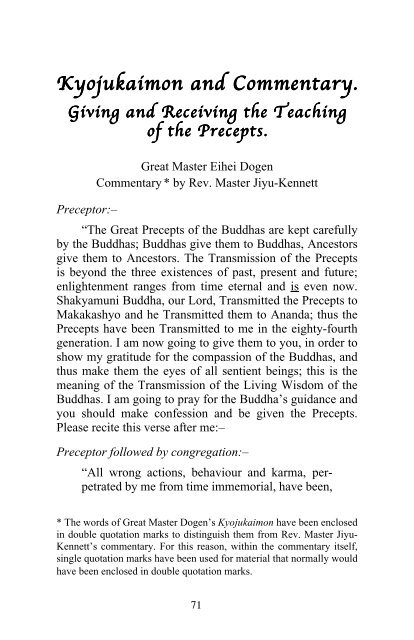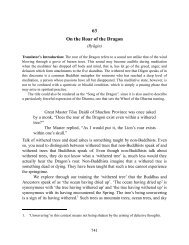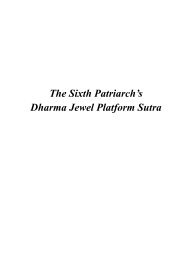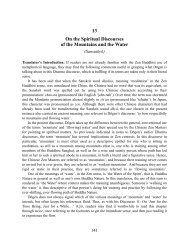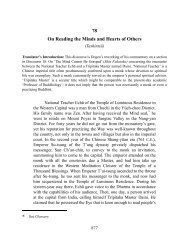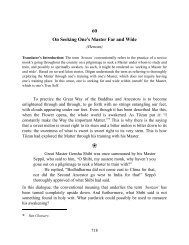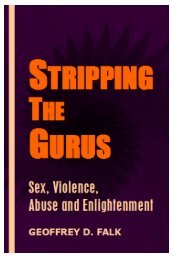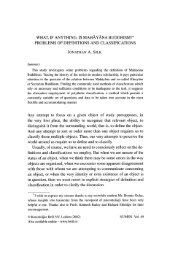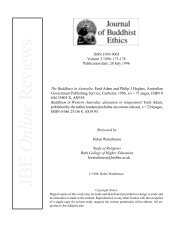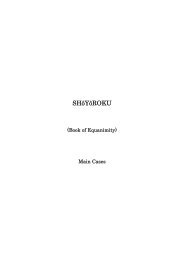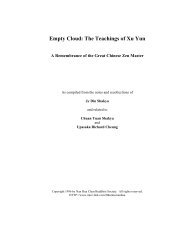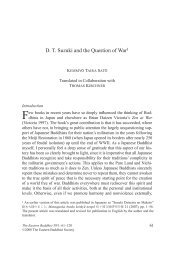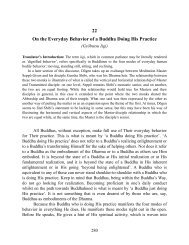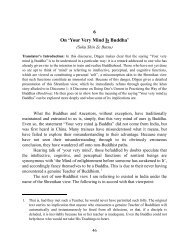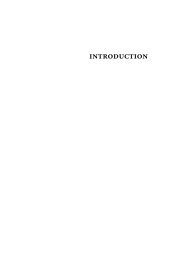Kyojukaimon and Commentary. - Shasta Abbey
Kyojukaimon and Commentary. - Shasta Abbey
Kyojukaimon and Commentary. - Shasta Abbey
Create successful ePaper yourself
Turn your PDF publications into a flip-book with our unique Google optimized e-Paper software.
<strong>Kyojukaimon</strong> <strong>and</strong> <strong>Commentary</strong>. 71<strong>Kyojukaimon</strong> <strong>and</strong> <strong>Commentary</strong>.Giving <strong>and</strong> Receiving the Teachingof the Precepts.Great Master Eihei Dogen<strong>Commentary</strong> * by Rev. Master Jiyu-KennettPreceptor:–“The Great Precepts of the Buddhas are kept carefullyby the Buddhas; Buddhas give them to Buddhas, Ancestorsgive them to Ancestors. The Transmission of the Preceptsis beyond the three existences of past, present <strong>and</strong> future;enlightenment ranges from time eternal <strong>and</strong> is even now.Shakyamuni Buddha, our Lord, Transmitted the Precepts toMakakashyo <strong>and</strong> he Transmitted them to An<strong>and</strong>a; thus thePrecepts have been Transmitted to me in the eighty-fourthgeneration. I am now going to give them to you, in order toshow my gratitude for the compassion of the Buddhas, <strong>and</strong>thus make them the eyes of all sentient beings; this is themeaning of the Transmission of the Living Wisdom of theBuddhas. I am going to pray for the Buddha’s guidance <strong>and</strong>you should make confession <strong>and</strong> be given the Precepts.Please recite this verse after me:–Preceptor followed by congregation:–“All wrong actions, behaviour <strong>and</strong> karma, perpetratedby me from time immemorial, have been,* The words of Great Master Dogen’s <strong>Kyojukaimon</strong> have been enclosedin double quotation marks to distinguish them from Rev. Master Jiyu-Kennett’s commentary. For this reason, within the commentary itself,single quotation marks have been used for material that normally wouldhave been enclosed in double quotation marks.71
72 <strong>Kyojukaimon</strong> <strong>and</strong> <strong>Commentary</strong>.<strong>and</strong> are, caused by greed, anger <strong>and</strong> delusionwhich have no beginning, born of my body, mouth<strong>and</strong> will; I now make full <strong>and</strong> open confessionthereof.Preceptor alone:–“Now, by the guidance of the Buddhas <strong>and</strong> Ancestors,we can discard <strong>and</strong> purify all our karma ofbody, mouth <strong>and</strong> will <strong>and</strong> obtain great immaculacy;this is by the power of confession.“You should now be converted to Buddha, Dharma <strong>and</strong>Sangha. In the Three Treasures there are three merits; thefirst is the true source of the Three Treasures;”—there isan Unborn, Uncreated, Unformed, Undying, Indestructible,the Lord of the House, That which speaks in silence <strong>and</strong> instillness, the ‘still, small voice.’“The second merit is the presence in the past ofShakyamuni Buddha”—all Those Who have truly transmittedBuddhism throughout eternity.“The third is His presence at the present time,”—allThose Who transmit the Truth, Who live by the Precepts <strong>and</strong>make them Their blood <strong>and</strong> bones, the Sangha, the embodimentof the Preceptual Truth of the Buddhas.“The highest Truth is called the Buddha Treasure,”—the knowledge of That Which Is, the knowledge of theUnformed, Uncreated, Unborn, Undying, Indestructible;the certainty, without doubt, of Its existence, the knowledgeof It within oneself, the Buddha living within oneself, theLord of the House Who directs all things. If you study trueBuddhism you will become as the water wherein the Dragondwells; it is necessary to know the true Dragon; it is necessaryto ask the Dragon, the Lord of the House, at all times tohelp <strong>and</strong> to teach. Only if you give all that is required of theprice that the Dragon asks will He show you the jewel; you
<strong>Kyojukaimon</strong> <strong>and</strong> <strong>Commentary</strong>. 73must accept the jewel from the Dragon without doubting itsvalue or querying the price.“Immaculacy is called the Dharma Treasure,”—onemust live with the roots of karma cut away. To do this wemust indeed know the housebuilder of this house of ego,know all his tools, know all his building materials; there isno other way that we can know immaculacy. The housebuilderof the house of ego must be known absolutely,recognised at all times. It is not enough to have a kensho;one must go back to the source of the karmic stream; onemust return to that source to find out what set it going.Kensho shows the slate is clean; to find the source of karmacuts its roots <strong>and</strong>, with constant training, keeps evil karmaat a minimum but, since there is nothing from the first, thereis nothing clean <strong>and</strong> nothing that is unclean—we cannotknow this, however, until we have first tried to clean it.‘Most houses can do with a thorough sweeping but even amillion sweepings will not clear away the dust completely.’Thus man remains in his body <strong>and</strong> accepts it, knowingthat nothing matters, that he is immaculate, always was <strong>and</strong>always will be. This is the immaculacy of the DharmaTreasure; this makes the immaculacy <strong>and</strong> harmony of theSangha Treasure possible. It is the knowledge of the TrueKesa, that which is immaculate above all dust <strong>and</strong> dirt, theknowledge that the dust <strong>and</strong> dirt are indeed a figment ofone’s own ego’s imagination as a result of past, accruedkarma, that makes possible the Transmission of the Lightfrom the far past to the now <strong>and</strong> the far future without words.The Scriptures show up blank pages; there is a Transmissionthat lies beyond them.“Harmony is the Sangha Treasure”—this is broughtabout by the knowledge that, no matter what a member ofthe Sangha may do, he is immaculate from the very beginning;there is nothing from the first. ‘Thus shall ye think ofall this fleeting world, a star at dawn, a bubble in a stream, achild’s laugh, a phantasm, a dream.’ Although this is true the
74 <strong>Kyojukaimon</strong> <strong>and</strong> <strong>Commentary</strong>.members of the Sangha, the Zen Masters, all beings arebound by the law of karma; they will pay the price of whatthey do. Thus is the mind of the Sangha Treasure.“The person who has realised the Truth really is calledthe Buddha Treasure;”—he is the embodiment of the Truth,he is Nirvana, he is the Embodiment of Enlightenment, heis the Treasure of the Buddha for, in him, can be seenfully-digested, Preceptual Truth.“The Truth that is realised by Buddha is called theDharma Treasure,”—that is the knowledge of the Unborn,Uncreated, Unformed, Undying, Indestructible; the livingwith this knowledge without doubt, the trusting eternally ofthe Lord of the House, the certainty of the Treasure Housewithin oneself at the gate of which sits the True Dragon Whois indeed the Lord of the House.“The people who study that which lies within theTreasure House are called the Treasure of the Sangha,”—theDharma <strong>and</strong> the Sangha are one <strong>and</strong> the same thing, beingthe embodiment each of the other, if fully-digested, PreceptualTruth is their rule of life. If you ask, ‘What is a monk?’you know that it is his Kesa.“He who teaches devas <strong>and</strong> humans is called theBuddha Treasure,”—he who gives true teaching, beingbeyond praise <strong>and</strong> blame, the holy <strong>and</strong> the unholy, right <strong>and</strong>wrong, without fear or favor, he who becomes ‘good’ forothers.“That which appears in the world in the Scriptures<strong>and</strong> is ‘good’ for others is called the Dharma Treasure,”—anything may teach. However infinitesimally small, howeverlarge, no matter what, all things may teach the Dharmawhen they live by fully-digested, Preceptual Truth, whenthey have cut away the roots of karma, when they know thehousebuilder of the house of ego <strong>and</strong> are constantly keepinghim from rebuilding again as a result of practising fullydigestedPreceptual Truth.
<strong>Kyojukaimon</strong> <strong>and</strong> <strong>Commentary</strong>. 75“He who is released from all suffering <strong>and</strong> is beyondthe world is called the Sangha Treasure;”—he for whom nolonger desires burn, wherein wants <strong>and</strong> cravings no longerexist; he who gets up in the morning <strong>and</strong> goes to sleep atnight, eats when he is hungry, sleeps when he is tired, issatisfied with that which he is given <strong>and</strong> does not ask formore than he can absolutely use in the immediate now.When someone is converted to the Three Treasures thus, hecan have the Precepts of the Buddhas absolutely.In this manner you should make the True Buddha yourteacher <strong>and</strong> not follow wrong ways. The True Buddha that isyour Teacher is indeed the Lord of the House, the TrueDragon. Do not hold on to your tiny kensho; trust the Lord ofthe House, hold fast by Him no matter what state you may bein, whether you are well or sick, brightly alive or dying, holdfast by the Lord of the House.The Three Pure Precepts“Cease from evil.This is the house of all the laws of Buddha; this isthe source of all the laws of Buddha.” The law ofkarma is one of the five laws of the universe; it isabsolute, it is inescapable. All are bound by thelaw of karma once it is set in motion. By accidentsomeone made the course of karma; it is not intentionallyset in motion; what happens, or happened,or will happen to you or to anyone else is causedby karma; by accident the wheel rolled the wrongway. Do not continue the rolling of the wheel inthe wrong direction by dwelling on the past orfearing the future; live now without evil. Stop thewheel now by cutting the roots of karma, byknowing the housebuilder of the house of ego; ifyou do not, karma will go on endlessly. The onlydifference between you <strong>and</strong> another being is that
76 <strong>Kyojukaimon</strong> <strong>and</strong> <strong>Commentary</strong>.you have the opportunity of knowing the Lord ofthe House right now, having heard the teachingsof the Buddha. Others may have less opportunitythan you but, when they hear it, who knows whichwill be first at the gate of the Treasure House?‘Cease from evil’ is absolute, in thought, in word,in deed, in body, in spirit. All are bound by the lawof karma; do not doubt this. You will pay foreverything you do if you do not cut the roots now<strong>and</strong> live by fully-digested, Preceptual Truth. Donot worry about the karma of others; each man hiskarma makes.“Do only good.The Dharma of Shakyamuni Buddha’s Enlightenmentis the Dharma of all existence.” Do not doanything unless it is ‘good;’ do not do anythingunless you have first asked the Lord of the Houseif it is good for you to do it. Do nothing whatsoeverin a hurry; do nothing whatsoever on thespur of the moment unless you know the certaintygiven by the Lord of the House; know that youmust take the consequences of what you do if it isnot a fully-digested act for you know What liesbeyond good <strong>and</strong> evil, right <strong>and</strong> wrong; you knowThat which lies beyond morality; you know theLord of the House. Ask the Lord of the House atall times before you do anything whatsoever. ‘Isit good? Is it Your will?’ If you do not ask theLord of the House, the housebuilder of the houseof ego will again pick up his tools <strong>and</strong>, before youknow it, there will be a great structure from whichyou must again escape. If a thing is ‘good’ in thisway it may be done; if it is not ‘good’ in this wayit should not be done; I am not speaking here ofgood <strong>and</strong> evil; I am speaking of ‘good’ in the sense
<strong>Kyojukaimon</strong> <strong>and</strong> <strong>Commentary</strong>. 77of if it is right; this is beyond right <strong>and</strong> wrong; if itis good is beyond good <strong>and</strong> evil. This teachingis indeed the teaching of Shakyamuni Buddha’senlightenment for there was not one of His actsthat was not the result of fully-digested, PreceptualTruth. If you live thus, doing that only whichis ‘good’ after you have asked the Lord of theHouse, after you know the true Lord of the House,then you can know the teaching of ShakyamuniBuddha’s enlightenment <strong>and</strong> know that His enlightenment<strong>and</strong> yours are identically the same;but this is only if you know who the Lord of theHouse is <strong>and</strong> do not suffer from the idea that youare the Lord of the House. Always you must askthe Lord of the House; always you must behumble in His presence. ‘Please teach me thatwhich it is good for me to do this day. Please showme that which it is good for me to teach this day.Please give me the certainty that I teach the Truth<strong>and</strong> know, indeed, that when the still, small voicewithin my mind <strong>and</strong> heart says “Yes,” I must obeythat teaching. When it says “No,” I must notdisobey that teaching.’ When the Lord speaks,spring up joyfully to answer; then, indeed, it isgood to do anything whatsoever He asks; knowthat the Lord will never break the Precepts. 1“Do good for others.Be beyond both the holy <strong>and</strong> the unholy. Let usrescue ourselves <strong>and</strong> others.” Do not set up a chainof causation that will cause others to do wrong; donot do that which will cause another to grieve; donot do that which will result in your creatingkarma for another being; do not accidentally setthe wheel of karma in motion. Do not let yourselfhear the words, ‘What demon allowed you tobecome a priest? From what demon did you learn
78 <strong>Kyojukaimon</strong> <strong>and</strong> <strong>Commentary</strong>.Buddhism?’ To be beyond both the holy <strong>and</strong> theunholy, to be beyond praise <strong>and</strong> blame, to act onlyfrom what the Lord of the House teaches withoutworrying whatsoever what the world may think isindeed to have understood the Three Pure Precepts.Before any act is performed you must askyourself, ‘Am I ceasing from evil in doing thisact? Is it good in the sight of the Lord of theHouse? Shall I cause another being to do harmeither to himself or to others? I cannot stop himdoing harm, for each man his karma makes <strong>and</strong>must carry for himself, but I can do that aboutmyself which will prevent me from accidentallystarting the course of karma. I must think carefullyof my every act. I may not cause another to makea mistake in Buddhism.’ By so doing we rescueboth ourselves <strong>and</strong> others for, in cutting the rootsof karma for ourselves, we help to cut the roots ofkarma for others also.“These three are called the Three Pure Precepts.” Withoutthem one cannot live the Buddhist life.The Ten Great Precepts“Do not kill.No life can be cut off for the Life of Buddha isincreasing. Continue the Life of Buddha <strong>and</strong> donot kill Buddha.” Above all, do not turn your faceaway from Buddha, the Lord of the House, for thisis indeed to commit spiritual suicide; to killBuddha is to turn away from Buddha. ‘Man st<strong>and</strong>sin his own shadow <strong>and</strong> wonders why it is dark<strong>and</strong> only he can turn round.’ To turn away fromBuddha is to say, ‘My ego is greater than the Lordof the House; my opinions are more right; mywishes are more important.’ It is you whom you
<strong>Kyojukaimon</strong> <strong>and</strong> <strong>Commentary</strong>. 79kill. If you do not listen to the Lord of the House inthis life, in what life will you listen to the Lord ofthe House? Will you for eternity attempt tocommit real suicide? If you always face theBuddha you will always know Buddha; if youalways listen to the Lord of the House there is nopossibility of your ever killing anything.“Do not steal.The mind <strong>and</strong> its object are one. The gateway toenlightenment st<strong>and</strong>s open wide.” There is nothingwhatsoever that can be stolen. ‘Preserve wellfor you now have,’ says the Scripture; each of uspossesses the Treasure House. All we have to do isask the Dragon for permission to enter, ask theDragon if we may see the jewel <strong>and</strong> it will begiven to us. He who tries to rob himself, he whotries to steal from the Treasure House can neverhave the Treasure; erudition is as this; takingdrugs is as this. All you have to do is ask the Lordof the House <strong>and</strong> you may know <strong>and</strong> possess allthings. The gateway to enlightenment does indeedst<strong>and</strong> open wide for the true mind of the Buddha<strong>and</strong> the jewel are one <strong>and</strong> the same; ask the Lordof the House at all times. Remember that ‘he whocounts another’s treasure can never have his own;’he who steals can only ever rob himself.“Do not covet.The doer, the doing <strong>and</strong> that which has the doingdone to it are immaculate therefore there is nodesire. It is the same doing as that of theBuddhas.” Thus there is nothing to be coveted <strong>and</strong>no one that covets. ‘Preserve well for you nowhave,’ says the Scripture. Since there is nothingfrom the first, how can there be anything to
80 <strong>Kyojukaimon</strong> <strong>and</strong> <strong>Commentary</strong>.preserve well? ‘The white snow falls upon thesilver plate; the snowy heron in the bright moonhides; resembles each the other yet these two arenot the same.’ Thus we think there is a difference;thus we think there is an ability to covet <strong>and</strong>something to covet; thus man makes mistakes.Indeed there is nothing from the first.“Do not say that which is not true.The Wheel of the Dharma rolls constantly <strong>and</strong>lacks for nothing yet needs something.” TheDharma is Truth itself but it needs expression. Hewho lies does not allow the Dharma to show itself,he does not allow the Dharma to be expressed, hedoes not allow the world to see the Dharma Wheelin action. And still the sweet dew covers the wholeworld, including those who lie, <strong>and</strong> within thatdew lies the Truth.“Do not sell the wine of delusion.There is nothing to be deluded about. If we realisethis we are enlightenment itself.” ‘Thus shall yethink of all this fleeting world, a star at dawn, abubble in a stream, a child’s laugh, a phantasm, adream.’ If you hold on to nothing whatsoeverthere can be no delusion nor can there be enlightenment;then there are no opposites. Thus, indeed,we are enlightenment itself—yet always we willhave the form <strong>and</strong> figure of old monks.“Do not speak against others.”Do not speak against the Lord of the House. Everyperson, every being is the Temple of the Lordwherein the Lord dwells, the still water whereinthe Dragon lives. If you speak against others youspeak against the Lord of the House. Do not try to
<strong>Kyojukaimon</strong> <strong>and</strong> <strong>Commentary</strong>. 81divide the Lord of the House; do not try to causewar within the Lord; do not try to make the Lordmake war upon Himself. “In Buddhism, the Truth<strong>and</strong> everything are the same; the same law, thesame enlightenment <strong>and</strong> the same behaviour. Donot allow any one to speak of another’s faults.” Donot find fault with the Lord of the House. “Do notallow any one to make a mistake in Buddhism.”To speak against the Lord of the House is thegravest mistake of which I know.“Do not be proud of yourself <strong>and</strong> devalue others.”It is enough for me to know the Lord of the House,to know that He dwells within all things. How canthere be devaluation of others if they are theTemple of the Lord? How can there be pride if allpossess equally within the Lord? “Every Buddha<strong>and</strong> every Ancestor realises that he is the same asthe limitless sky <strong>and</strong> as great as the universe.When they realise their true body there is nothingwithin or without; when they realise their truebody they are nowhere more upon the earth.”There is nothing to be proud of <strong>and</strong> nothing to bedevalued.“Do not be mean in giving either Dharma or wealth.”Since all possess the Lord, there is nothing to begiven <strong>and</strong> nothing to be taken away, <strong>and</strong> still allthings must be given, all things offered at all times<strong>and</strong> in all places. “One phrase, one verse, the hundredgrasses,”—all contain the Lord, all expressthe Lord—each in its own way <strong>and</strong> each perfectly.“One Dharma, one enlightenment, every Buddha,every Ancestor.” No difference, nothing greater,nothing smaller; nothing truer, nothing less true.When all is within the Lord, all st<strong>and</strong> straight
82 <strong>Kyojukaimon</strong> <strong>and</strong> <strong>Commentary</strong>.together, a million Buddhas st<strong>and</strong> in one straightline. Out of gratitude to the Buddhas <strong>and</strong> Ancestorswe give Dharma, we give wealth, we give lifeitself—strength, youth, beauty, wealth, everythingthat we have <strong>and</strong>, even then, we cannot givethanks enough for one second of their truetraining; we can never repay their kindness to us.Only by our own true training is this possible <strong>and</strong>then, again, there is no repayment; it is just thework of a Buddha.“Do not be angry.There is no retiring, no going, no Truth, no lie;there is a brilliant sea of clouds, there is a dignifiedsea of clouds.” Just there is that going on whichcauses us to see unclearly; but if we truly look, ifwe look with care, we will see that the true <strong>and</strong>beautiful sky is shining behind the clouds; we maysee the Lord of the House. No matter how angrythe person is who is with us, we may see in him,too, the Lord if we are truly looking, if our ownego is out of the way <strong>and</strong>, in seeing the Lord inhim, he can see the Lord in us. The depth of theocean is still even when there is a great storm uponits surface; thus should we be when there is anger,knowing that nothing whatsoever can touch theTruth.“Do not defame the Three Treasures.To do something by ourselves, without copyingothers, is to become an example to the world <strong>and</strong>the merit of doing such a thing becomes the sourceof all wisdom. Do not criticise but accept everything.”The Lord of the House does not always dothings in the normally accepted ways, nor do theBuddhas <strong>and</strong> Ancestors; they are not individual
<strong>Kyojukaimon</strong> <strong>and</strong> <strong>Commentary</strong>. 83<strong>and</strong> they are not the same as each other. Eachexpresses the Truth in his own way as do allthings; they do that which they do in their way <strong>and</strong>express the Lord within it. Do not criticise the wayof another, do not call it into question; look withinit <strong>and</strong> see the Lord. Look with the mind of aBuddha <strong>and</strong> you will see the heart of a Buddha. Tocriticise is to defame the Lord of the House. Lovethe Lord of the House at all times—know Him,talk to Him; never let a day go by when you do notconsult with Him even on the slightest matter.Then you will never, as long as you live, defamethe Three Treasures.“These sixteen Precepts are thus.Be obedient to the teaching <strong>and</strong> its giving; accept it withbows.”Note.1. When one ‘asks the Lord’, one should know that the Lord will nevertell you to break the Precepts—any of them; if you hear to the contrary,the voice you are hearing is the voice of self <strong>and</strong> not the voice of theLord. The teaching given in this paragraph must not be taken out of context<strong>and</strong> either made into a quick <strong>and</strong> easy substitute for full Preceptualinquiry or applied to trivial things. There are brief periods in trainingwhen a Preceptual review of every action is advisable in order to deepenone’s underst<strong>and</strong>ing of the Precepts; at such times the teaching of thischapter is applied to every act one does. At all other times it is importantthat one be willing to apply it to all things <strong>and</strong> at the same time be bothpractical <strong>and</strong> spiritually mature in reserving this type of inquiry for trulyimportant matters, while accepting the responsibility for using the TenPrecepts <strong>and</strong> one’s wise discernment to guide one’s behaviour in everydaymatters.Whenever one does ‘ask the Lord’, one must also do all of the otheraspects mentioned in this chapter, including carefully considering thelikely consequences of one’s proposed actions, comparing those actionsto the Ten Precepts <strong>and</strong> other Scriptures <strong>and</strong>, especially, consulting <strong>and</strong>following the advice of the Sangha. To do only part of this is to fail totake Refuge in the Three Treasures; such a course of action is contrary toBuddhist teaching. Be warned: there are no shortcuts to Buddhist training<strong>and</strong> all people, including full Zen Masters, will reap the karma oftheir actions. [JK]


